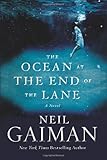Book Reviews: The Ocean at the End of the Lane, American Gods (The Tenth Anniversary Edition)
The Ocean at the End of the Lane
Neil Gaiman is one of my favorite authors. There are certain writers that I’ll read anything published by, and he’s on that short list. (In no particular order, it’s Neil Gaiman, Neal Stephenson, Alan Moore, Gail Simone, Ursula K. Le Guin, Robin McKinley, Patricia A. McKillup, Louise Erdrich, Zen Cho.) The Ocean at the End of the Lane is Gaiman’s first novel for adults in eight years, so it was an automatic buy for me.
And I wasn’t disappointed. I will say that I didn’t find the book transformative the way many reviewers apparently did. Gaiman is generally a spare and restrained stylist, and the book follows a narrative arc that’s fairly conventional for its genre (starting out very grounded in real-world experiences and gradually yielding to a fantastic element), so nothing about the novel was immensely striking as I read it. I wasn’t “blown away.”
Instead, I found myself left with a lot to chew on after the last page had turned. What I find most impressive about The Ocean at the End of the Lane is its vulnerability and honesty around the subject of childhood—the way children know so much more than adults would like to imagine they do, and yet can be so easily stripped of any power or agency by even the well-meaning adults in their world. And how a malevolent adult is a true horror. I would say that the book deals with a theme of abuse, though not didactically or allegorically or anything like that. But it is about the dawning realization that things are bad, very bad; the despair of reaching out for help and not being believed; and the terror and guilt and shame as the situation escalates and every attempt at self-defense proves futile. And, in the end, it is about the triumph and grace that comes when that little claustrophobic sphere of helplessness is shattered and the former child (because this process is one of coming-of-age) emerges into a world of connection and meaning and powerful interdependence vaster than his juvenile self would have ever been able to comprehend.
It’s a good read, but probably an even better re-read.
American Gods (The Tenth Anniversary Edition)
Gaiman’s publishers have also recently put out an updated version of American Gods, restoring a number of cuts that were originally made due to the book’s length. The longer version, however, remains the “author’s preferred text.” And in this case the author was right.
American Gods is a huge, sprawling work, and most of the restored material is in some way ancillary to the main plot. But it’s important to the book nonetheless. Re-reading American Gods with the new material, I was mostly struck by Gaiman’s technical proficiency in maintaining a sense of urgency and forward narrative momentum even while weaving in and out of a huge cast of characters and a time span of centuries. Together the digressions work to create a sense of elegy and grandeur looming behind the protagonist and the foregrounded events of his story. It restores some of the sense of awe and wonder that really does belong in a book about gods—even diminished, near-forgotten gods.
American Gods is a markedly better book with the restoration of the original material. The new edition is very much worth getting.













